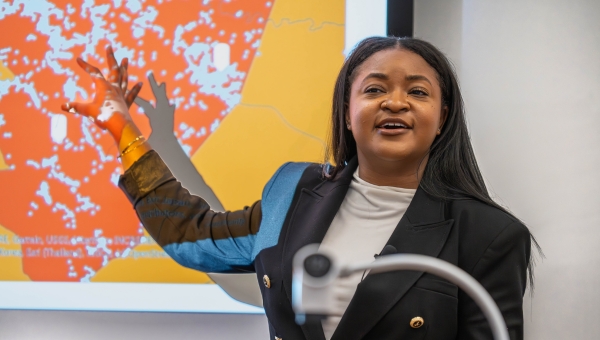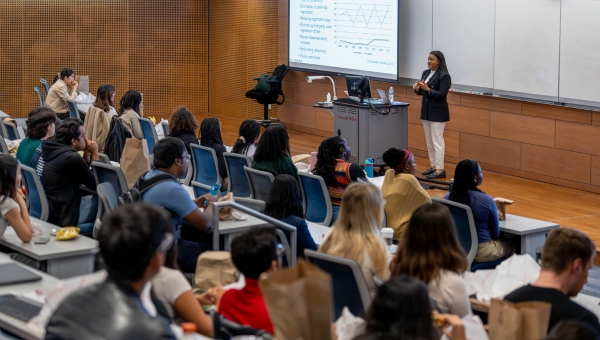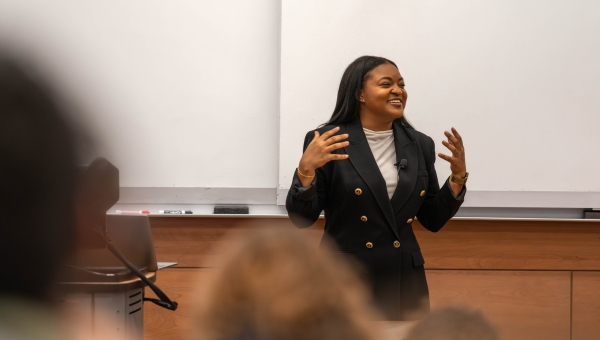States have passed laws that make voting harder. Heinz alumna Chelsea Jones uses data to advocate for reform.
By Emma Folts
That’s according to the Brennan Center for Justice at the New York University School of Law, a nonpartisan law and policy institute that tracks the restrictive voting laws states pass. The number of these laws has exploded since 2013, when the U.S. Supreme Court rolled back a provision of the landmark Voting Rights Act that helped protect against racially discriminatory policies.
Chelsea Jones (MSPPM ‘18) is a researcher for the Brennan Center. She uses data to study racial representation in elections and the impact of restrictive policies, supporting the center’s efforts to advocate for reforms. “I'm happy to be on the research side of driving that change,” she said.
Currently, Jones and her colleagues are studying the quantitative impact of the barriers to voting that Indigenous communities face. People living on tribal lands struggle to vote in U.S. elections because of geographic isolation, a lack of assistance for Native language speakers and a lack of polling sites. Their research, expected to be published in November, is intended to help the center push for the Native American Voting Rights Act, which aims to make polling sites more accessible.
“Oftentimes, when voter groups are not participating at the same rates as others, we assume that it's for a lack of interest or lack of engagement, which is most times not the case, especially when it comes to Native American communities,” said Jones, who earned her doctoral degree from the University of California, Los Angeles in 2023.

Making an Impact after Heinz College
Chelsea Jones discussed her work during an Oct. 22 talk at Heinz College, where she earned her master's degree in public policy and management.
Jones joined the Brennan Center in August 2023. Ahead of Election Day, she said the center is focused on voters’ ability to cast their ballots at conveniently located, well-resourced polling places without fear or intimidation. The center works with the nonpartisan Election Protection coalition to flag potential instances of interference.
Advocating for reforms
Before President Lyndon B. Johnson signed the Voting Rights Act into law in 1965, states had implemented measures such as poll taxes and literacy tests to prevent Black residents from voting. To address this challenge, the Voting Rights Act barred certain jurisdictions from altering voting rules without approval, or “preclearance,” from a court or the U.S. Department of Justice.But in 2013, the U.S. Supreme Court effectively struck down the use of preclearance.
States have since issued a flood of restrictive laws that are more likely to harm marginalized communities, Jones explained. The Brennan Center found that the gap in voter participation between Black and white Americans had increased in roughly the decade since the Supreme Court’s ruling after declining since the Civil Rights Movement of the 1960s.
The voter experience, state by state, is very different, and the reason is because states are free to pass laws without accountability. ... We need new provisions, new protections –– and we have the ability to have them.Dr. Chelsea Jones
There’s not a one-size-fits-all solution to voter suppression, Jones said, but she and the center are backing several reforms.
They include the John R. Lewis Voting Rights Advancement Act and the Freedom to Vote Act, which would together reinstate preclearance for eligible states and, generally, require that states offer early voting for at least two weeks before Election Day, for at least 10 hours a day. Inaccessible polling places pose a significant barrier to voters who rely on public transportation or are unable to take time off work, Jones said.

Using Data to Study Voter Suppression
Chelsea Jones regularly performs statistical and data analysis using the coding language R and GIS programming, skills she learned at Heinz College.
Beyond those laws, Jones said the center supports bans on guns at polling places –– currently in effect in at least a dozen states –– and the dismantling of state laws that prevent people with felony convictions from voting. The center also wants to ensure that jurisdictions properly maintain their voter rolls. Some election officials have purged voters to prevent alleged fraud, sometimes too close to an election or based on faulty information. Voter fraud is very rare in the U.S.
“People should not have to vote in every single election to be able to stay on a voter registration list. If they register to vote, they should be respected as people who have the intention or the ability to vote, at every point,” Jones said.
How Jones approaches her research
One of the first research questions Jones considered stemmed from her time at the University of Texas, Austin, where she earned her bachelor’s degree in 2015. While Jones said she could vote at her university, her friends at Prairie View A&M University, a historically Black university in Texas, didn’t have a polling place on campus.Prairie View gained a polling site on campus, after years of advocacy, in 2013. But the problem led Jones to later explore the impacts of polling place closures on Black people as a doctoral student at the University of California, Los Angeles. She continues to draw on her observations, conversations and personal experiences in her work, she said.
“For me, to start a research project often comes from seeing a phenomenon or hearing a conversation or witnessing an inequity, and asking myself, ‘What's behind that?,’” she said. “The next step is the data: ‘What do we need to know to answer this question?’”

The Fight for Voting Rights Continues
Chelsea Jones, whose grandparents witnessed the Civil Rights Movement, said she has a personal responsibility to advance voting rights and address today’s inequities.
Though she regularly performs statistical and data analysis in her work at the Brennan Center –– she often uses the coding language R and GIS programming –– she didn’t have these skills when she came to Heinz College. That knowledge gap made her nervous at first, but she said that navigating her more challenging coursework alongside other students was helpful.
Students may not always view their analytical skills as relevant in supporting social causes, but Heinz College teaches them to investigate data creatively and learn to make quantitative arguments for issues that are important to them, Jones said.
Jones, whose grandparents witnessed the Civil Rights Movement, said she has a personal responsibility to advance voting rights and address today’s inequities.
“For as long as there is racial inequity, there will be something for me to advocate for,” Jones said. “I think that my goal, and I think my colleagues’ as well, is to work ourselves out of a job. We don't want to have to fight for voting rights anymore. So, once that issue is solved, we move to the next issue.”